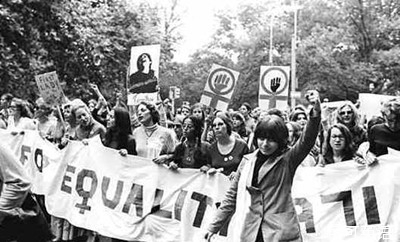GWEN IFILL:Forty years after it became legal, the debate over abortion has not gone away.
According to a new Wall Street Journal/NBC News poll released today, 70 percent of Americans do not want to see Roe v. Wade, the Supreme Court decision which legalized the practice, overturned. But 58 percent of those polled for the survey also favored imposing some limits on abortion. A Pew Research poll last week found 63 percent opposed overturning Roe v. Wade.

But the parameters of the discussion have evolved, as the battleground has shifted from Washington to the states.
Joining us to discuss the shape of that debate four decades later are Charmaine Yoest. She's president of Americans United for Life. And Nancy Keenan, outgoing president of NARAL Pro-Choice America.
Welcome to you both.
So, 40 years later, is Roe vs. Wade still relevant?
NANCY KEENAN, NARAL Pro-Choice America: Absolutely.
And I think because the whole issue around whether individual women make a decision with their family, their doctor, their God, or whether politicians sitting here in Washington in the states, as a governor or a state legislator, absolutely is relevant. And it is something that we all have to be vigilant around in protecting this very basic freedom for women.
GWEN IFILL:Charmaine Yoest, is the fight playing out still on the federal level, or has it moved on?
CHARMAINE YOEST, Americans United for Life: It's really moved on. The day after Roe, abortion policy will be governed by the state, closer to the people, where it belongs.
And over the last two years, Americans United for Life's legal team has been involved in seeing the passage of 50 bills that are limiting abortion in ways that the American people see as very commonsense, parental consent, informed consent, clinic regulations. There's a lot going on at the state level that is exciting and energizing to this movement.
GWEN IFILL:If the anti-abortion movement has been chipping away at the edges over these 40 years, while everybody has been focused in Washington and keeping the Supreme Court out of this, are they making progress?
NANCY KEENAN:Well, I think what happens is that when we see, for example, personhood being introduced in Mississippi, and when the people have the actual opportunity to vote at that ballot box, they vote no and they reject it.
We saw the abortion ban in South Dakota twice defeated by the people. I think the thing here is that politicians that are being elected are stealth. They don't run—they don't come to your door saying they're going to be run and be anti-choice or they're going to restrict women's access.
They come and they talk to you about the economy and jobs. Then they get there, and people are finding that these laws are passed, many which are outrageous, and they don't accept. We saw that in Virginia, when there was outrage over the mandatory transvaginal ultrasound. Women spontaneously showed up at the capitol, saying, stop this nonsense.
GWEN IFILL:Charmaine Yoest, your folks have said for a while that we're moving from talking about the baby to talking about the mother and talking about women.
But these issues, these personhood initiative amendments, and the transvaginal discussion that happened in Virginia, how does that fit into your strategy?
CHARMAINE YOEST:Well, I think it's just a little bit funny for Nancy to completely write off state legislators, who are very close to the people.
And over the last few years, we have had 2,500 requests in 39 states from state legislators for help to pass pro-life legislation. So there is a real vibrancy right now to looking at commonsense kinds of solutions that fit where the American people are.
GWEN IFILL:What happens at the ballot box when it's not being done by legislators?
CHARMAINE YOEST:Well, I think it's a little disingenuous to discount what legislators are doing, when they actually report to the people and can be thrown out of office.
GWEN IFILL:But you're discounting the ballot box?
CHARMAINE YOEST:No, I'm not discounting the ballot box. What I'm saying is that there is a real dynamism to what is going on.
And you're seeing such—there was a three-fold increase in legislative action across the country over the last several years. So I think that we're very energized by this and see a real gain—momentum gathering as we move forward into the next decade.
GWEN IFILL:Let's talk about that.
If there are—you say they're stealth. But if they are legislators who represent this point of view who are getting things done, who are getting these bills enacted, how is your movement pushing back against that?Or are they?
NANCY KEENAN:It's all about the elections. And it's all about making sure that those people that are elected, whether it's at the courthouse or to the White House, that they share the values of the American public, as you have seen at the polls.
The American public doesn't want Roe overturned. They also reject these barriers that are being put up for women. I will give you the example of the ultrasound, a forced procedure against her will without a doctor's recommendation. And these are politicians sitting in a statehouse saying, we know best. We know best for you what the decision should be one way or another.
So, yes, these politicians are being elected. My point is, is that they are some of the most extreme in the country and that the people, if they knew more specifically what they were standing for, if they ran on their pro-life values, I think they'd be rejected also at the ballot box.













